Without further ado, this cartoon sums up nicely what I think of recent events in the Gaza strip.
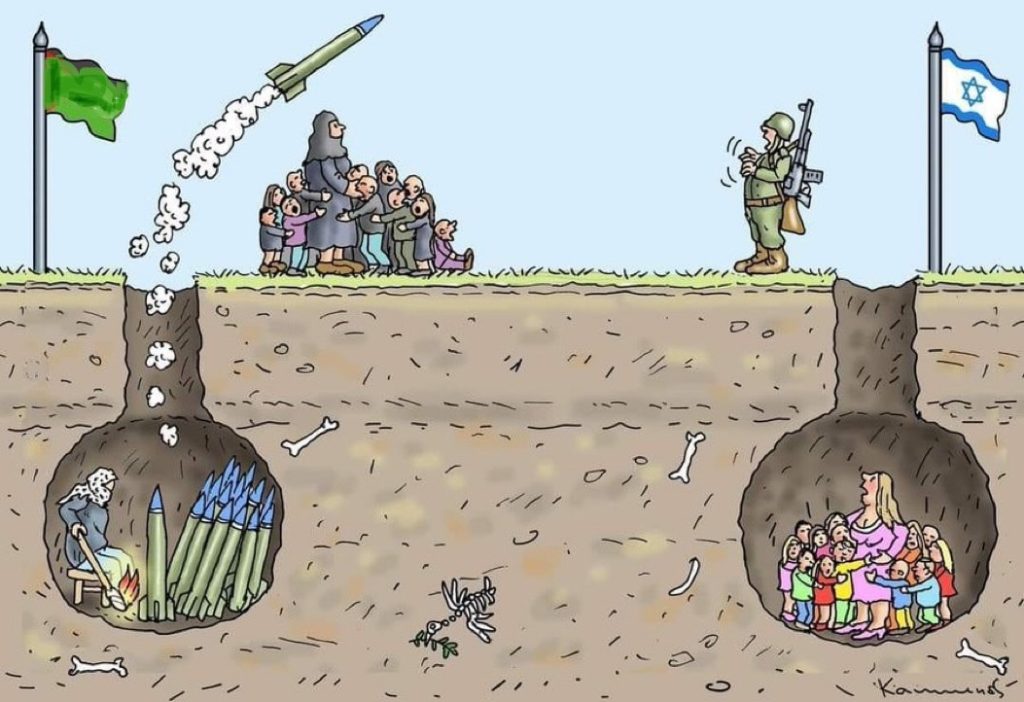
Without further ado, this cartoon sums up nicely what I think of recent events in the Gaza strip.

The world is not heading in the right direction. Not by a long shot. The golden era that began in 1945 and saw an unprecedented number of people around the world find relative peace, prosperity, and security for nearly eight decades, may be coming to an unpleasant end. There is a Hungarian saying (“kutya is jódolgában megy a jégre”) that may have a loose equivalent in English in the form of the proverb, “you never miss the water till the well runs dry”.
Here are a few things that concern me, in no particular order:
There are probably a few more that I have not mentioned, including petty domestic Canadian issues, such as the gloriously incompetent bills C-11/C-18 by which Canada tries to control online media.
Individually, each of these issues would be considered serious, but certainly not insurmountable. When they come all at the same time… The last time the world faced something similar was in the late 1920s, early 1930s. We know how well that turned out. Tens of millions of deaths, the rise of two of the worst totalitarian ideologies in history, a world war and the deployment of two nuclear weapons later…
Those nuclear weapons proved to be genuine peacemakers: Few can argue that they had a major role convincing all participants to play kind of nice, making sure that certain lines in the sand remain firmly uncrossed. But the inhibitions against their use are becoming weaker over time.
Am I being an alarmist? I don’t think so. I’m pretty sure the people who woke up today to the sound of air raid sirens in Israel, or found themselves at the end of the day in Hamas custody as human shield hostages do not think so either.
Earlier today, I was looking at amazing pictures of an abandoned Siberian town, Kadykchan. Built at the cost of the lives of countless gulag prisoners, the town lost its population after the breakup of the USSR, and now serves as little more than a sad reminder of entire chapters of 20th century history. I think one of the images of that town that I saw might serve well as a cautionary tale.
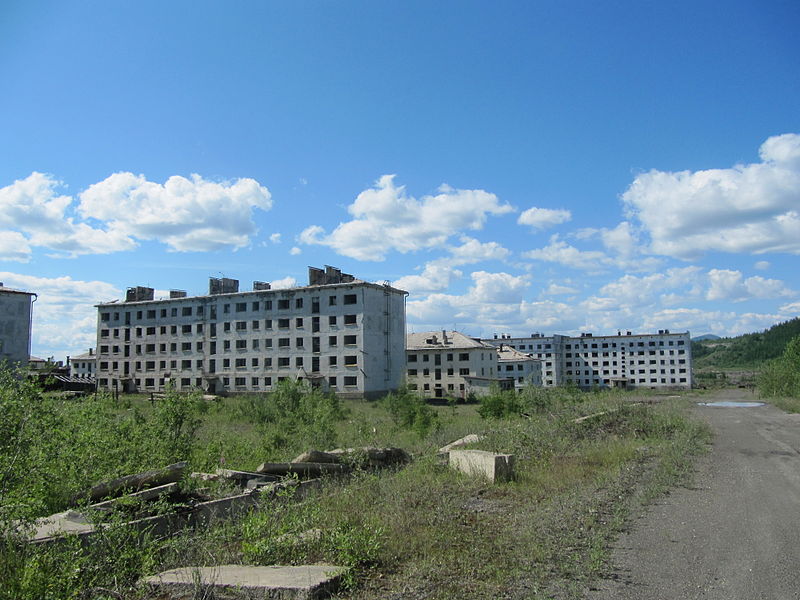
How about coming to our senses before it’s too late, before we turn much of the world into a similar post-apocalyptic wasteland?
PS: My AI friend Claude suggested toning down this post a little, to make it less alarmist. I don’t want to. I am alarmed.
So this has been in the news lately, too: a discovery of remnants of a wooden structure that is almost half a million years old.
It is truly incredible. These tools, these worked pieces of now petrified wood, predate the emergence of homo sapiens by several hundred thousand years.
Not for the first time I am left wondering just how much of the past will remain forever hidden from us. The earliest human whose name is known to us lived roughly 5000 years ago. Let that sink in for a moment. Modern human behavior began roughly 100,000 years ago, give or take. Presumably, this behavior involved language, social structures and, well, names. These were our ancestors, millions and millions of them, who inhabited the Earth for countless generations. And we don’t even know their names.
And now this, some 476,000 year old logs along with simple stone tools that were used to shape them. That suggests some form of permanence. Which implies a structured society. Skills, transferred from one generation to the next. Language. Culture. About which we know nothing.
Half a million years. That is, 100 times what counts as recorded history. An eyeblink in geologic terms, to be sure, but for us humans? The word that pops into my mind is… humbling.
In his “1984”, Eric Arthur Blair, better known under the pen name George Orwell, at one point has the protagonists reading a book about the history of oligarchical collectivism, the dominant ideology of the totalitarian “IngSoc” regime of Oceania. They read,
Throughout recorded time, and probably since the end of the Neolithic Age, there have been three kinds of people in the world, the High, the Middle, and the Low […] The aims of these three groups are entirely irreconcilable. The aim of the High is to remain where they are. The aim of the Middle is to change places with the High. […] For long periods the High seem to be securely in power, but sooner or later there always comes a moment when they lose either their belief in themselves or their capacity to govern efficiently, or both. They are then overthrown by the Middle, who enlist the Low on their side by pretending to them that they are fighting for liberty and justice. As soon as they have reached their objective, the Middle thrust the Low back into their old position of servitude, and themselves become the High.
So here is the thing: Liberal democracy is an aberration. An outlier. A period in history with no real “High”. We have no emperors, Kaisers, Caesars or Sultans. Monarchs, maybe, but mere figureheads in constitutional monarchies, not tyrants. In places like Canada, the United States, Western Europe and many other parts of the world, only the Middle and the Low exist. To be sure, the Middle can still be pretty darn powerful: political dynasties, tycoons and captains of industry, even public figures like media personalities wield substantial power. But their might is constrained by the system of institutions that we call liberal democracy: rule of law, freedom of enterprise, freedom of conscience, civil liberties or the separation of powers among them.
But this is not good enough, just not good enough for many among the elites of the Middle. They want more. Always more. And they fight. Throughout much of history, their enemy was the High. But in a liberal democracy, it is now the system of institutions that they fight against. Yet the tactics are the same. They enlist the Low. Don’t trust the system, they tell the Low. Elections are fake. Judges are corrupt or biased. Government lies to you. The rule of law is “weaponized”, they assert. Whatever it takes… but the real objective is to abolish the very constraints that prevent the Middle from becoming the new High.
And they are succeeding. Just look at the range of countries that are now on lists characterizing their retreat from democracy. Look at all the populists who are systematically undermining key pillars of liberal democracy, such as freedom of the press, the independence of the judiciary, even the electoral process. Will they succeed? I’d argue that they already succeeded in a number of countries and they are well on their way to success in many other places.
Liberal democracy, after all, is not a normal state of affairs for humanity. It’s an exception. It is no accident that some of the greatest 20th century writers of science-fiction, such as Isaac Asimov or Frank Herbert, did not envision a democratic future. Asimov’s future in Foundation was a monolithic Galactic Empire that persisted for well over 10,000 years. Herbert’s Dune similarly envisioned a feudal society.
And if history is any guide, when the would-be tyrants succeed, they all too often will continue to maintain a semblance of democracy. After all, for centuries following the demise of the Roman Republic, emperors continued to issue decrees and coins bearing the acronym SPQR, Senatus Populusque Romanus, falsely suggesting that Rome is still governed by a Senate that answers to the people, not by an all-powerful emperor. But this is just a cheap conjurer’s trick to assure the masses, the Low: All that is being done is done for them, and in their name.
Here’s My Brightest Diamond, singing about High Low Middle. Not sure if they were inspired by Orwell, but it’s strangely appropriate.
Here’s a Hungarian-language letter, an official note from 120 years ago that has been making the rounds on the Hungarian Interwebs for many years already. As far as I know, the letter is real, penned by a well-known Hungarian scholar, also known for his poetry. Below is my translation: watch it, the language is more than a little, hmmm, rough.
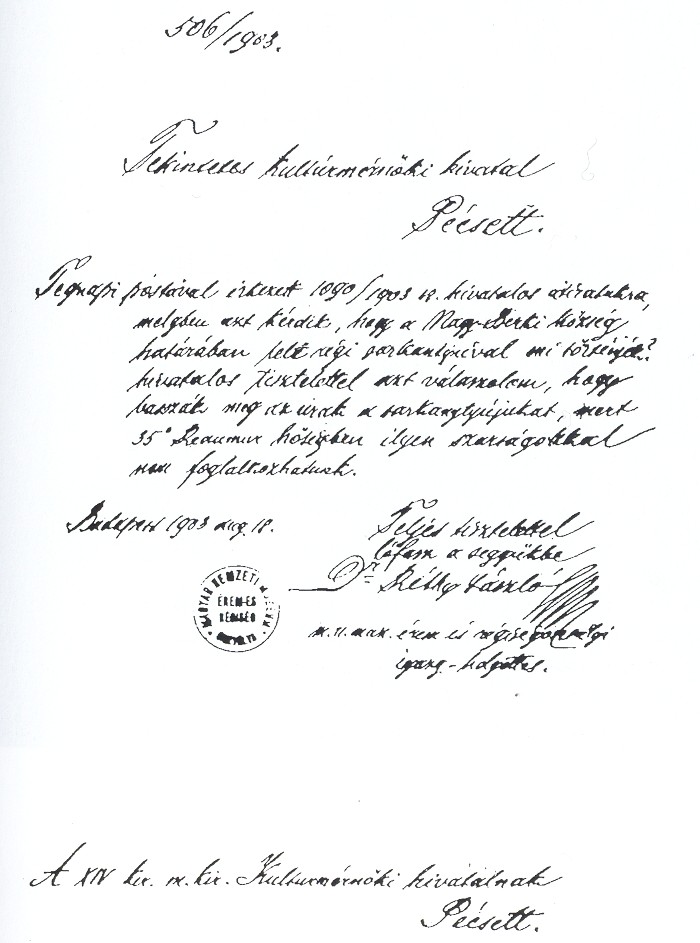
506/1903
To the esteemed Public Works Office
in the town of PecsConcerning your official transcript 1090/1903 that arrived with yesterday’s mail, in which you ask what needs to be done with the old spurs that were found in the outskirts of the village Magyarbeki? With official respect, my answer is that you gentlemen should fuck your spurs, because in this heat of 35° Reaumur, we cannot deal with such shit.
Aug 18, 1903, Budapest.
With all due respect,
Horsedick up your ass
Dr. Laszlo Rethy
Deputy Director, Hungarian National Museum, Department of Coins and AntiquitiesTo the Hungarian Royal Public Works Office of District XIV, Pecs
Ahem. For what it’s worth, 35°R is 44°C or about 111°F.
In other words: damn hot.
Howard Hughes was a great example. A captain of industry, a tycoon, whose life ended in mysery, ruined by mental illness no doubt, but wealth and success must have played their part, along with nearly limitless hubris.
There are others, both real-life folks and characters in fiction who fell into this trap. The tycoon Andrew Ryan of the Bioshock computer game franchise. Elon Musk with his increasingly erratic decisions that led, among other things, to the on-going corporate value destruction at Twitter.
We all know the expression, tragedy of the commons. But what to call it when wealth and power destroys a person, one who gave so much real value to the world, one who started off as a visionary, a revolutionary “captain of industry”? I asked our AI friend Claude and Claude offered a perfect answer: call it the tragedy of the tycoons.
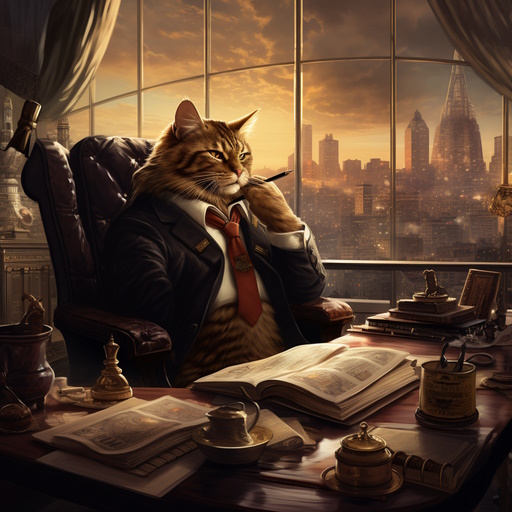
I even have the perfect illustration, courtesy of our other AI friend, Midjourney.
I am looking at images of nearly 4000 year old clay tablets.
Clay tablets like Si.427, depicting a survey of land. And incidentally, also demonstrating the use of the theorem of Pythagoras well over a thousand years before Pythagoras was born.
If only I had a time machine… To witness how these people lived. How they laughed, how they cried. They studied, the learned, they applied what they knew. They built a magnificent civilization. They loved and they hated, they offered sacrifices and committed betrayals. They had fun, they enjoyed a good meal, they entertained. They lived.
And we know so little about them. What did they do for fun? What were they talking about at the dinner table? What were their hopes for their children? What did they know about the world? What were their trades? How did they pass on their knowledge to others? Did they travel? Did they enjoy a day of rest at the beach?
All gone. An entire civilization, that was routinely using artifacts with precision diagrams like this tablet. All gone and almost completely forgotten, other than these bits and pieces, these fragments.
It’s humbling.
Here is a bit of history of which I was not aware: The window tax.
Back in the 18th, 19th century in many jurisdictions around the world, buildings, especially rental properties, were taxed by the number of windows that they sported.
The advantage of this tax was that it was easy to assess: the assessor just had to walk around the building and count.
The unfortunate reality, namely that the tax most disproportionately affected the poorest of the poor? Well, eventually these taxes were repealed but I wonder how many generations grew up in windowless rooms.
Do people still pay attention to the Doomsday Clock, published by the Bulletin of the Atomic Scientists?
Perhaps they should. Perhaps the fact that they don’t is a big part of the problem.
For here we are, in 2023, and the Doomsday Clock was just set to an unprecedented 90 seconds before midnight. Never before were we this close.
Ukraine, of course, is part of it, along with the recklessly irresponsible nuclear threats of Putin and his cronies. The use of nuclear power stations like Chernobyl and Zaporizhzhia as bargaining chips also represent a red line that should never have been crossed.
For better or for worse, we are witnessing history in the making in the great United States.

What it will lead to, I don’t know. I am apprehensive.
A year ago today, the (almost) unthinkable happened: Russia launched a full-scale war of conquest against its neighbor Ukraine.
I say “almost” because, well, let’s face it, similar things did kind of happen in the past. Russia did, after all, launch a major war against Hungary’s revolutionary government in 1956, in a successful bid to crush the anti-Stalinist revolution and ensure that the country remains firmly in the East Bloc. A similar, albeit smaller-scale invasion took place in Czechoslovakia in 1968.
But still… what is happening in Ukraine is the worst Europe has seen since the end of WW2. And it is naked aggression, more reminiscent of Hitler’s attack on Poland than the USSR maintaining control of the East Bloc during the Cold War.
And it is evil. Let’s not mince words. The excuses are laughable. The aggression is inexcusable. And the war crimes and human rights violations are revolting.
Yet Ukraine stands. Against all odds.
Where this war leads, I have no idea. Frankly, I am surprised that a year later, it remains confined within Ukraine’s borders. Will it remain that way? Or is Ukraine the opening salvo in WW3?
I worry because way too many people now speak of WW3 as something that can be “won”. To be sure, I have no doubt that if WW3 comes, the West will win. But at what price? How many hundreds of millions will die?
Peace would be nice. But we must not confuse peace with appeasement. The world made that mistake in Munich in 1938 and paid dearly for it. Putin must not be rewarded for his aggression. Sometimes, strength is the best guarantee of peace, and signs of weakness invite conflict.
In her famous 1984 song, German singer-songwriter Nena sang about 99 balloons that trigger World War III.
Here is the ending of the song, along with my less-than-perfect translation:
| Neunundneunzig Jahre Krieg Ließen keinen Platz für Sieger Kriegsminister gibt’s nicht mehr Und auch keine DüsenfliegerHeute zieh’ ich meine Runden Seh die Welt in Trümmern liegen Hab ‘n Luftballon gefunden Denk’ an Dich und lass’ ihn fliegen |
Ninety-nine years of war Left no room for a victor There are no more war ministers Also no more fighter bombersToday as I took a stroll Saw a world, ruined by war There, I just found a balloon Thinking of you, I let it fly soon |
What can I say? A few more Chinese balloons over North America, a few more large-scale exchanges in Ukraine, and perhaps we’ll no longer need any war ministers anymore.
This is our cat Rufus, doing his darnedest best to look like Italy’s former fascist dictator, Benito Mussolini, aka. Il Duce:

Mind you, unlike Mussolini, Rufus has not established himself as the leader of a totalitarian tyranny. (He couldn’t. Our other cat Freddy would also have a say in the matter and I don’t think he would approve.)
On the other hand, Rufus occasionally craps in places where he shouldn’t, and that was not a habit that Il Duce was known for.
So this is 2023. And suddenly I am reminded of the year 1973. A different world, 50 years ago, and not necessarily a happy one.
It was the year the Vietnam War officially ended for the United States. It was the year marking the beginning of the OPEC crisis.
The Apollo program was canceled but the United States launched Skylab, America’s short-lived space station.
Iconic buildings, including the Sears Tower in Chicago and the Sydney Opera House, were completed.
A tumultuous year in politics, 1973 saw the US Supreme Court decide in Roe vs. Wade, a decision that was overturned 49 years later by a conservative court majority. The year also marks the beginning of Watergate. Meanwhile, vice president Spiro Agnew resigns and Gerald Ford takes his place, paving his way to become America’s first, and to date only, unelected president.
NASA launches Pioneer 11; and before the year is out, Pioneer 10 (launched earlier, in 1972) reaches Jupiter.
But what makes this year especially memorable for me was that in the summer, my Mom and I traveled to Ferihegy Airport in Budapest and boarded a Swissair DC-8 taking us to Zurich, where we switched planes, boarding another Swissair flight, a DC-10, taking us to Montreal. We were visiting my aunt, here in Ottawa.
That visit was beyond incredible. Canada! Of course as a child, I was most impressed by superficial things, such as the number of channels even my aunt’s old black-and-white television set was able to pick up through a rooftop antenna. (Saturday morning cartoons!) Still, superficial or not, what I saw I suppose thoroughly inoculated me against communist propaganda. And, needless to say, this experience played a major role in my decision to leave Hungary 13 years later, eventually settling right here in Ottawa, a beautiful city that — thanks in no small part to that childhood visit — feels like my true hometown.
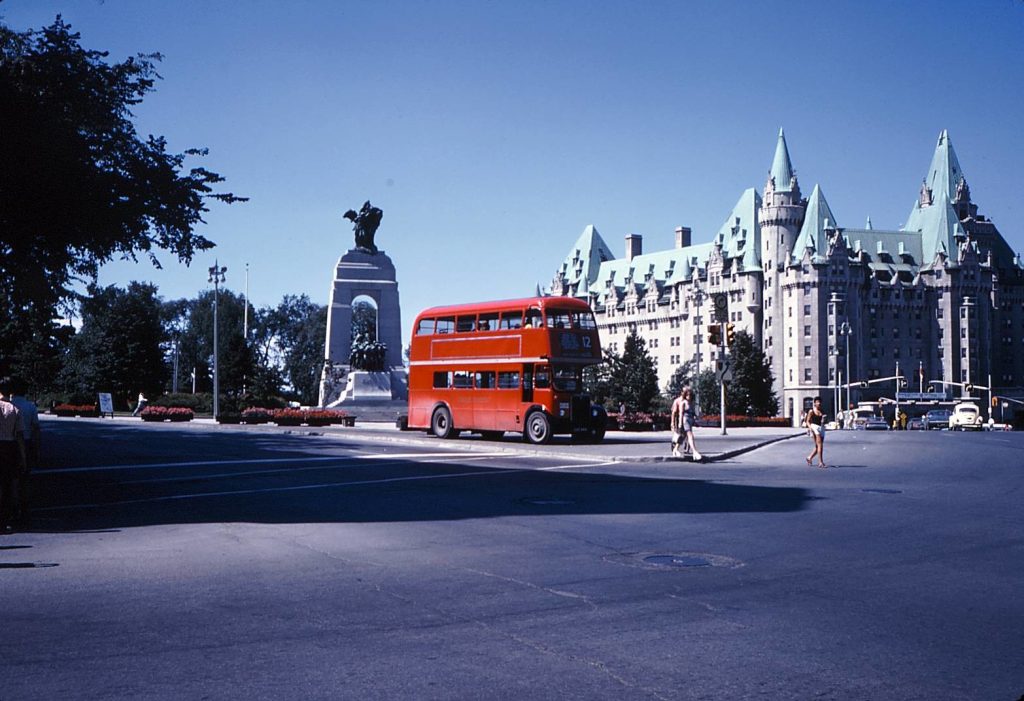
One of the many images from an extraordinary album by “Busman Extraordinaire” Paul A. Bateson on Flickr, showing Confederation Square as it appeared in the summer of 1973, when my Mom and I were visiting. I remember these sightseeing buses, imported from the UK, complete with right-hand drive.
And that visit was (almost) 50 years ago.
This year my simple Christmas wish seems more urgent than before. War is raging in a part of Europe that should have seen the last of its share of trenches and artillery bombardments in 1945; instead, it’s a modern war zone, with innocents killed, infrastructure wantonly destroyed, people displaced, and cruelty reigning, just to satisfy the messianic complex of a deranged tyrant.
And the risk of escalation remains very real: 2023 may not be a good year for many of us.
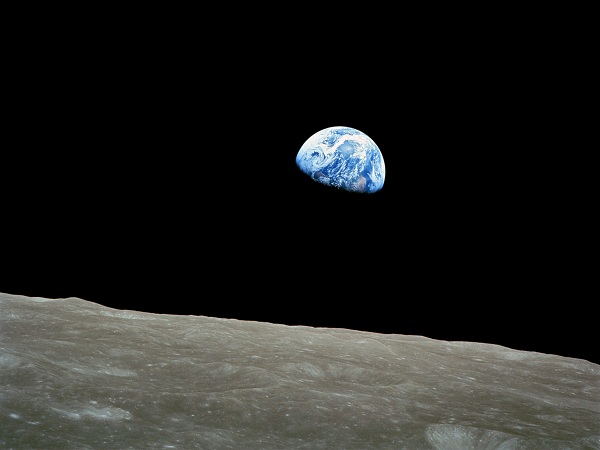
As always, I cannot think of more appropriate words on December 24 than those uttered by Frank Borman, commander of Apollo 8, the first manned mission to orbit the Moon (and the first vehicle in the history of humanity that carried humans to a spot cut off from all other humans who ever lived, as they disappeared behind the far side of the Moon):
[G]ood night, good luck, a Merry Christmas – and God bless all of you, all of you on the good Earth.
CNN reports a Russian attack (likely unintentional, but an attack nonetheless) on a Polish farm, killing two.
That’s an attack on the territory of a NATO state.
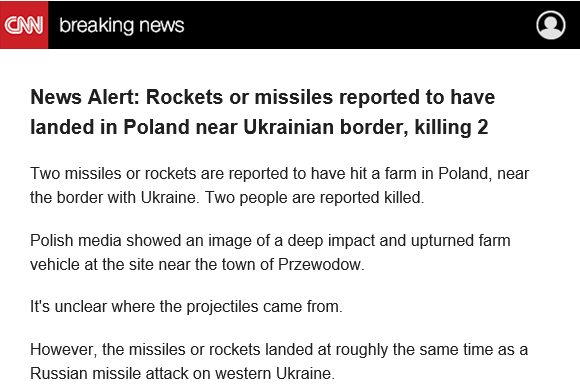
To those who know my city of birth, Budapest, this is an astonishing picture that I came across on Facebook.
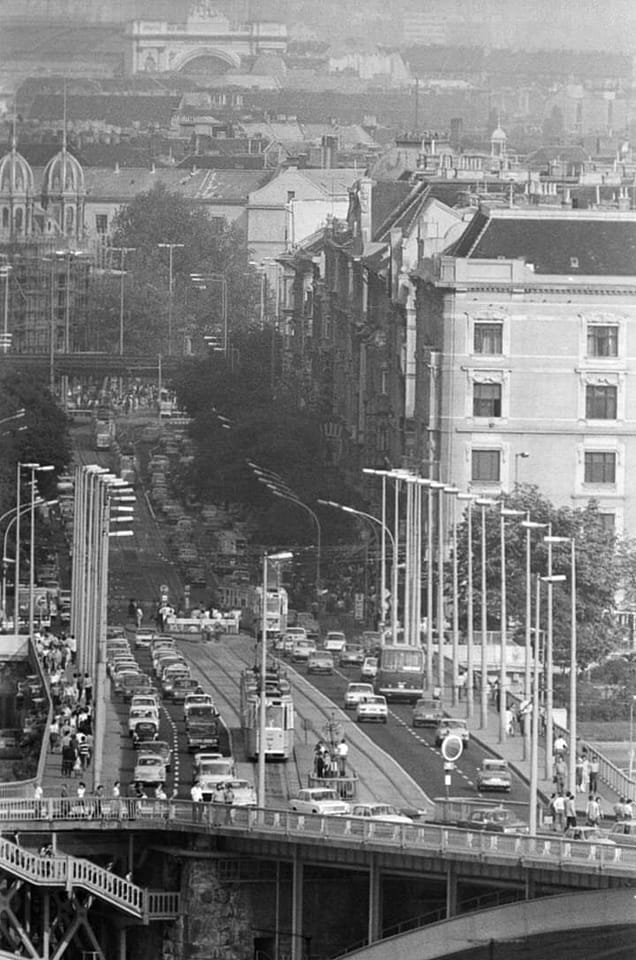
In the foreground is Margaret Bridge, spanning the Danube. The kink in the bridge is where it touches Margaret Island. Beyond that, on the Pest side, it’s Saint Stephen’s Boulevard, named after Stephen I, Hungary’s first king. The two small domes on the left are part of the Western (“Nyugati”) railway station building, designed by none other than Gustave Eiffel (yes, that Eiffel).
But then… thanks to the magic of the telephoto lens, in the background we see another major railway station, the Eastern (“Keleti”) station. I never before realized that these two railway stations, which are actually miles apart, line up like this.
Not only that but behind that second railway station, we can even see some housing projects that are quite some distance away, near the terminus of the city’s #2 subway line.
Telephoto lenses are really tricky. By the way, in case anyone wonders, the image is from 1982. There’s plenty of traffic on the bridge, but notice that most of the cars are characteristic East Bloc models: Ladas, Trabants, a Skoda, a Moskvich if I am not mistaken, a Wartburg. The buses are the same Ikarus models that once roamed the streets even here in Ottawa. The streetcars were built by Hungary’s Ganz. That streetcar line is supposedly the world’s busiest, today served by rather nice-looking, very long, high-capacity Siemens trains.
Oh, moments after posting about not having worthwhile subjects to post about, I suddenly remembered something that I have been meaning to post about for some time. That is to say, Moore’s law in computing, the idea that the capabilities of computer technology roughly double every 18-24 months or so.

It has been true for a long while. Gordon Moore made this observation back in 1965, when I was just two years old.
I observed a form of Moore’s law as I was swapping computer hardware over the years. My first major planned upgrade took place in 1992, when I built a really high end desktop computer (it even had a CD-ROM drive!) for many thousands of dollars. Months later, my older desktop machine found a new life as my first ever Linux server, soon to be connected to the Internet using on-demand dial-up.
The new desktop machine I built in ’92 lasted until 1998, when it was time to replace it. For the first time, I now had a computer that could play back DVDs without the help of external hardware. It also had the ability to capture and display video from cable. Ever since, I’ve been watching TV mostly on my computer screen. I watched the disaster unfolding on September 11, 2001 and the tragic end of the space shuttle Columbia on February 1, 2003 on that computer.
Next came 2004, when I executed a planned upgrade of workstation and server, along with some backup hardware. Then, like clockwork, 2010 and finally, 2016, when I built these fine machines, with really decent but low power (hence low thermal stress) Xeon CPUs, three of them.
And now here we are, in late 2022. More than six years have passed. And these computers do not feel the least bit obsolete. Their processors are fast. Their 32 GB of RAM is more than adequate. Sure, the 1 TB SSDs are SATA, but so what? It’s not like they ever felt slow. Video? The main limitation is not age, simply finding fanless video cards of decent capabilities that a) make no noise, b) don’t become a maintenance nightmare with dust-clogged fans.
I don’t feel like upgrading at all. Would feel like a waste of money. The only concern I have is that my server runs a still supported, but soon-to-be-obsoleted version of CentOS Linux. My workstation runs Windows 10 but support won’t be an issue there for quite a while.
And then there are the aging SSDs. Perfectly healthy as far as I can tell but should I risk relying on them after more than 6 years? Even high-end SSDs are becoming dirt cheap nowadays, so perhaps it’s time to make a small investment and upgrade?
Moore’s Law was originally about transistor counts, and transistor counts continue to rise. But transistor counts mean nothing unless you’re interested in counting transistors. Things that have meaning include execution speed, memory capacity, bandwidth, etc. And on all these fronts, the hardware that I built back in 2016 does not feel obsolete or limiting. In fact, when I look at what I would presently buy to build new machines, quite surprisingly the specs would only differ marginally from my six year old hardware. Prices aren’t that different either. So then, what’s the point, so long as the old hardware remains reliable?
I admit that to date, I only viewed the first season of Game of Thrones. One of these days, I’ll watch the rest but there’s so much good television and so little time… I don’t spend much time watching TV, so I am behind even with series that I really like. (Hint: haven’t yet finished the last season of The Sopranos.)
Yet… I get the catch phrase. Winter is coming. And yes, I am filled with a sensation of dread because winter, indeed, is coming. quite possibly the world’s worst winter since… 1914? 1939? 1941? Not sure.
For some reason, I keep thinking about a silly but perhaps relevant analogy: the flight envelope. Move too slow, your airplane falls out of the sky. Move too fast and your airplane is overstressed and disintegrates. The higher your altitude, the smaller the difference between the two, until eventually you run out of options: no matter what you do, you fall out of the sky. That was the tragic fate of AF447 over the Atlantic Ocean 13 years ago.
And I now feel that geopolitics is locked in a very similar pattern. With each and every passing day, our options are becoming more constrained. Take Putin’s nuclear threat, combined with the sham referenda he’s organizing in the occupied Ukrainian territories. He says he’s not bluffing. What if he means it? What are our options if he does deploy a tactical nuke in the battlefield?
There really are no good choices.
If we do nothing, that will only encourage him to go for more. The rest of Ukraine. Moldova. A Kaliningrad corridor. Perhaps the Baltic states since if NATO failed to respond to nukes in Ukraine out of fear of triggering a nuclear world war, he can count on NATO’s restraint in the Baltics, too. Where will he stop? Will he stop?
If we respond tit-for-tat, with a NATO tactical nuke, that risks escalation. The genie is now truly out of the bottle.
The best option I can think of is to use all of NATO’s might to do two things: 1) immediately establish a no-fly zone over all of Ukraine, and 2) use a direct, overwhelming conventional strike to annihilate the unit that launched the nuke.
This still carries the risk of escalation. But at least it would show that the West is not afraid to respond, it just calibrates its response appropriately: to deter, but not to escalate. And of course telegraph this well in advance, to make it clear to Putin that unlike him, the West really isn’t bluffing.
Yet I cannot escape the thought of that flight envelope. When the difference between your minimum speed and your top speed gets reduced to nothing, that means you have no good options left. Whatever you do, you fall out of the sky.
Winter is coming. A winter bringing with it the risk of escalation in Ukraine. A global food crisis as a result of the Ukraine war. An energy crisis (which may be mitigated but cannot be fully averted) in Europe. Growing tensions concerning Taiwan. A democracy crisis throughout the West as right-wing populism prevails and the rule of law suffers.
I am increasingly convinced that October 1962, the Cuban missile crisis, was a pleasant afternoon tea in a kindergarten, surrounded by friendly teddy bears, compared to what we now face, in the fall of 2022.
Back then, the choices were clear and the major players shared a common goal: avoid global confrontation.
Today? The choices are murky and we have leaders who built cults on the shared belief that they are all victims. That they have no choice but to defend themselves. From what, you ask? Well, how about defending yourself from the rule of law when you want to break it. Defending yourself from a country you attacked and tried to destroy or occupy. Defending yourself from a territory that does not want to live under your one-party totalitarian regime. Of course they do not see things this way. And that’s what make things scary.
And that’s why I worry that winter, indeed, is coming, a kind of winter we have not seen in many generations, if ever.
From the opening scenes of the Fallout 3 computer game:
War. War never changes.
Since the dawn of human kind,
when our ancestors first discovered
the killing power of rock and bone,
blood has been spilled in the name
of everything: from God to justice
to simple, psychotic rage.
In recent weeks, I came across two quotes that are worth recording here.
As I watch Florida’s governor playing cheap board games with the lives of Venezuelan refugees, I recall the words of Italian author and philosopher Umberto Eco:
We need an enemy to give people hope. Someone said that patriotism is the last refuge of cowards: those without moral principles usually wrap a flag around themselves, and the bastards always talk about the purity of the race. National identity is the last bastion of the dispossessed. But the meaning of identity is now based on hatred, on hatred for those who are not the same. Hatred has to be cultivated as a civic passion. The enemy is the friend of the people. You always want someone to hate in order to feel justified in your own misery. Hatred is the primordial passion. It is love that’s abnormal.
The hypocrisy of those who cry the loudest for freedom was already evident two centuries prior, to British author Dr. Samuel Johnson:
How is it that we hear the loudest yelps for liberty among the drivers of negroes?
The more times change, the more they remain the same, I guess.